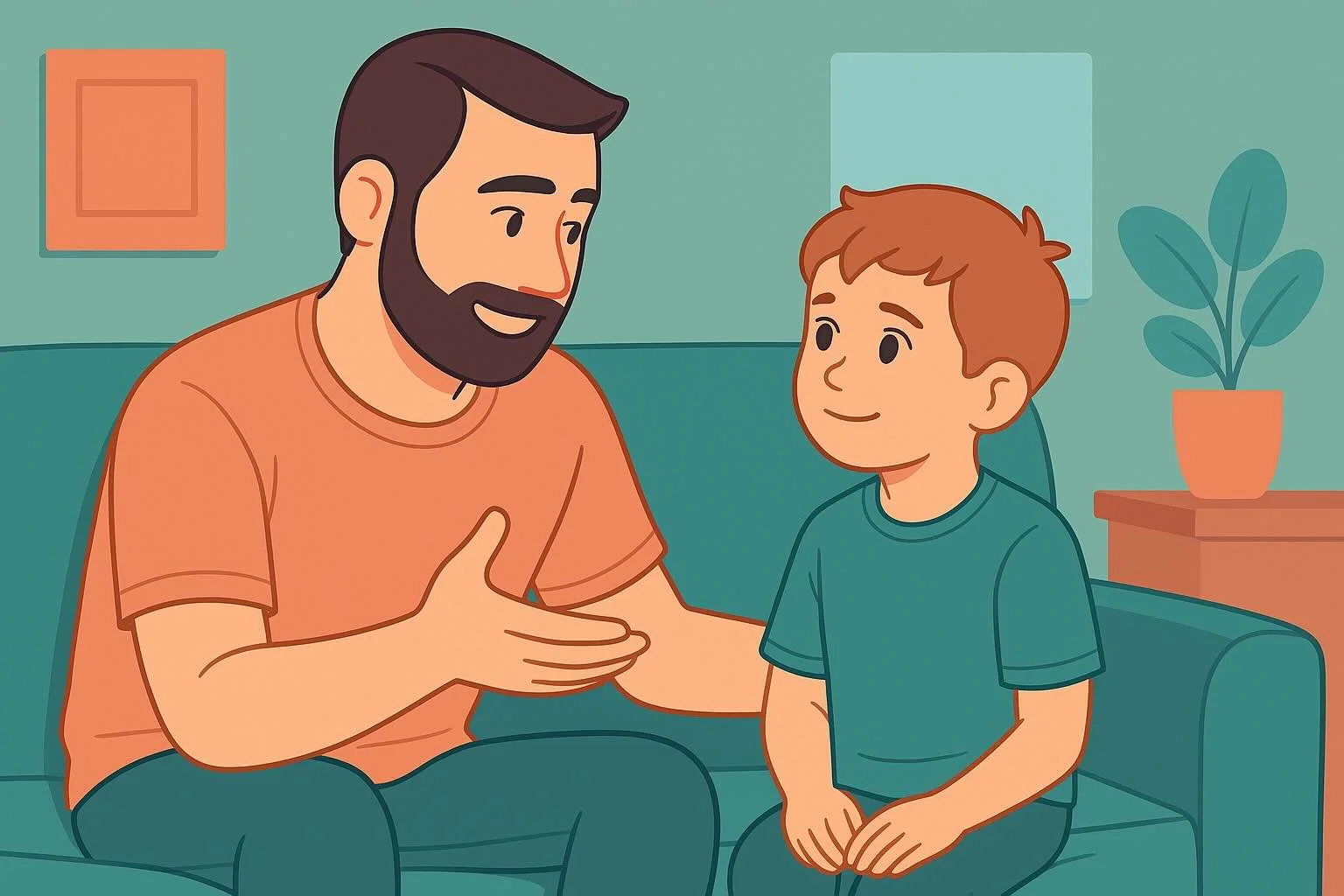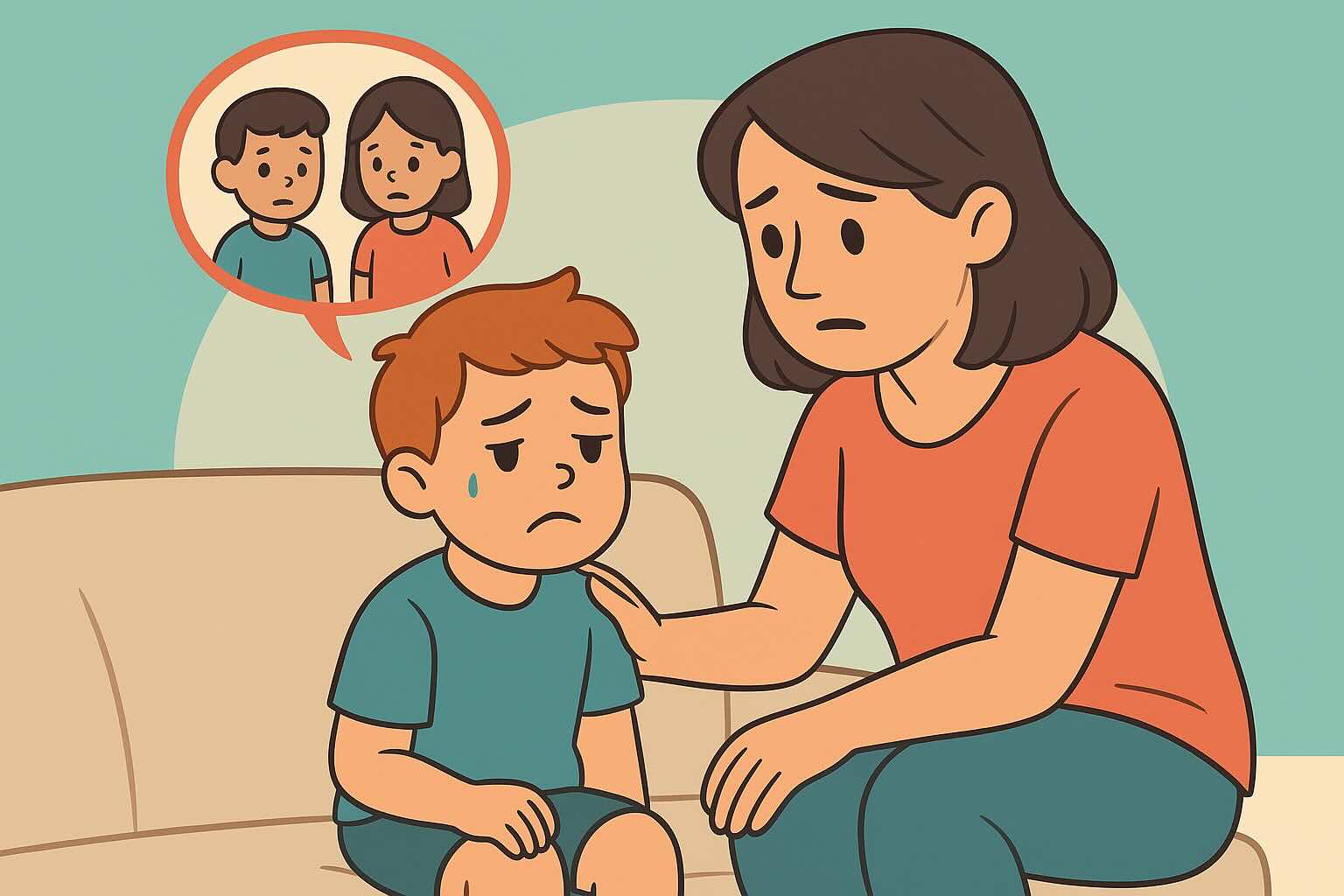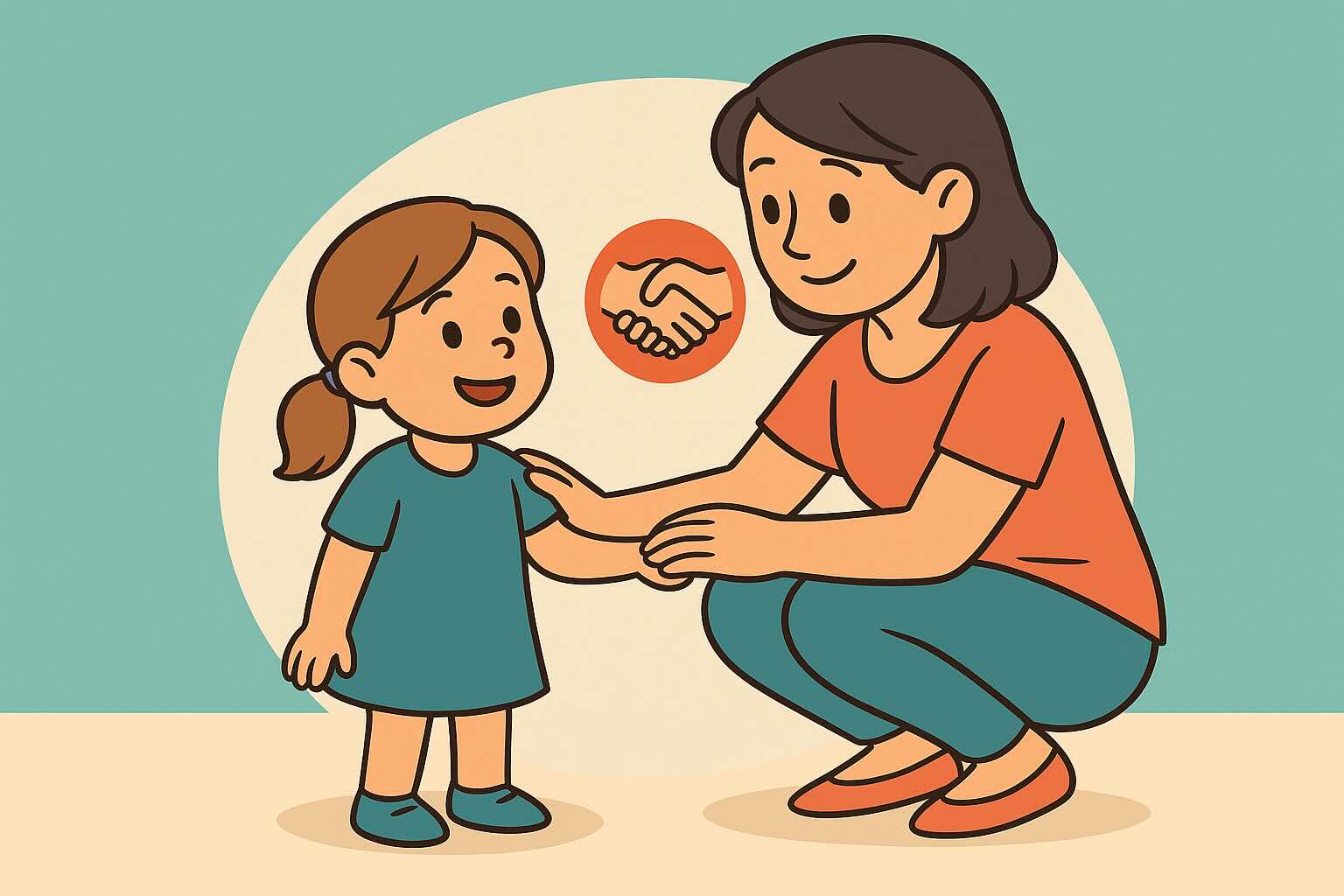No One Likes Me: 8 Scripts That Transform Social Pain Into Confidence

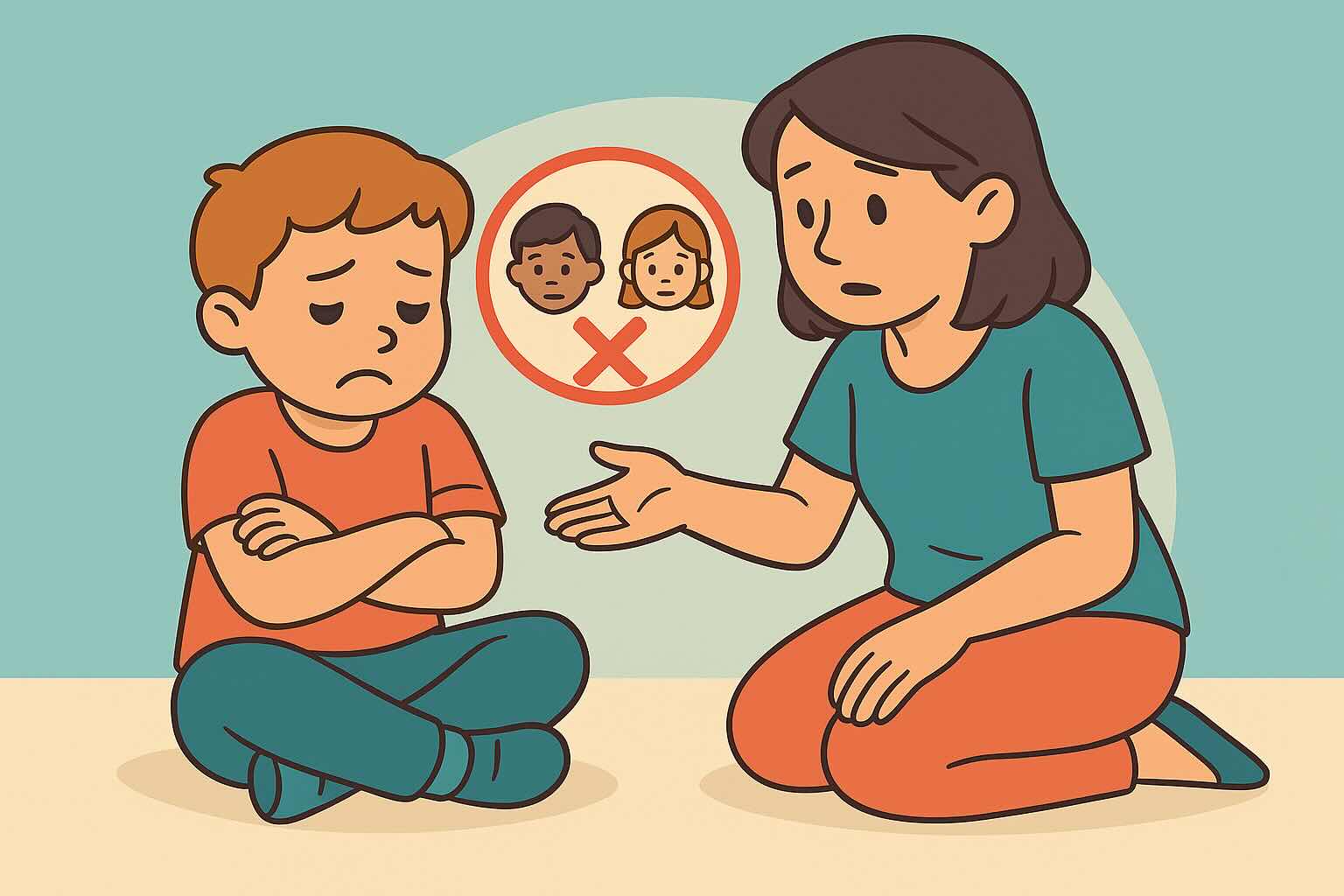
"No One Likes Me": Complete Parent's Guide to Social Misunderstandings (Ages 3-7)
When Your Child Feels Rejected, Excluded, or Misunderstood
When your child comes home declaring "No one likes me!" or "Everyone was mean to me today," your heart probably breaks a little. You want to fix their social world immediately and protect them from all rejection and disappointment. But here's what most parents don't realize: these dramatic statements usually reflect normal childhood social dynamics, not actual social crises.
Young children see social interactions through a very narrow, self-focused lens that makes ordinary conflicts feel like major rejections. Understanding this developmental reality is the first step in helping your child navigate friendships more successfully.
This comprehensive guide provides evidence-based strategies for addressing social misunderstandings, building genuine social skills, and supporting your child through the inevitable ups and downs of childhood friendships.
Social challenges can affect children of any temperament. For understanding your child's personality-specific needs, check out our guides on cooperative children, sensitive children, and spirited children. Start with our personality identification guide to understand your child's natural temperament pattern.
What You'll Learn in This Guide
- Why Children Misinterpret Social Situations - The developmental reasons behind "everyone is mean to me"
- The Information Gathering Process - How to discover what really happened
- Teaching Perspective-Taking - Helping them see beyond their own viewpoint
- Building Social Problem-Solving Skills - Practical tools for handling conflicts
- Age-Specific Social Challenges - Different issues for 3-4 vs. 5-7 year olds
- When to Worry vs. When to Coach - Distinguishing normal conflicts from serious problems
- Creating Positive Social Experiences - Setting your child up for friendship success
Estimated reading time: 13 minutes
Why Children Misinterpret Social Situations
The Egocentric Perspective
Young children naturally see the world through their own lens, putting their wants and needs at the center of every interaction. This isn't selfishness—it's a normal developmental stage.
How egocentrism affects social interpretation:
- They assume others' actions are specifically directed at them
- They can't easily consider others' motivations or feelings
- They interpret neutral events as personal attacks or rejections
- They struggle to see situations from multiple perspectives
- They assume their experience is universal
Real-life examples:
- Friend doesn't want to play their suggested game = "They don't like me"
- Teacher chooses someone else for a special job = "The teacher hates me"
- Classmate is having a bad day and snaps = "Everyone is mean to me"
- Friend plays with another child = "They're not my friend anymore"
Extreme Thinking Patterns
Children think in absolutes: all or nothing, always or never, everyone or no one. This black-and-white thinking makes temporary disappointments feel permanent and universal.
Common extreme interpretations:
- One conflict becomes "We always fight"
- One friend being busy becomes "No one wants to play with me"
- One mistake becomes "I'm bad at everything"
- One rejection becomes "Nobody likes me"
- One difficult day becomes "Everyone is mean"
Limited Social Experience
Young children simply haven't lived long enough to understand that social dynamics are complex, temporary, and often have nothing to do with them personally.
What they don't yet understand:
- People have bad days that affect their behavior
- Friends can play with others without rejecting them
- Conflicts are normal and can be resolved
- Everyone experiences social disappointments
- Relationships have natural ups and downs
- People have different preferences and personalities
The Information Gathering Process: What Really Happened?
Step 1: Manage Your Own Reaction
When your child reports social problems, your first instinct might be to:
- Immediately comfort and rescue them
- Get angry at the other children or adults
- Jump to conclusions about what happened
- Start planning how to fix the situation
Instead, take a breath and remember:
- Most childhood social conflicts are learning opportunities
- Your child's initial report may not reflect the full story
- Your role is to coach, not rescue
- Gathering information helps both you and your child understand the situation better
Step 2: Validate Their Feelings First
Before investigating what happened, acknowledge how your child feels.
Validation statements:
- "That sounds really hard."
- "It makes sense that you're upset about that."
- "Those feelings are important."
- "I can see why that didn't feel good."
- "It's disappointing when things don't go the way we hoped."
Avoid jumping to solutions immediately:
- Don't say "I'm sure they didn't mean it" before you know what happened
- Don't minimize their feelings with "It's not that bad"
- Don't immediately start problem-solving before understanding the situation
Step 3: Ask Investigative Questions
Help your child paint the complete picture through gentle, curious questioning.
Information-gathering questions:
- "Can you tell me more about what happened?"
- "What were you doing right before this happened?"
- "What exactly did [friend] say/do?"
- "How did you respond when that happened?"
- "Were other kids there? What were they doing?"
- "What do you think [friend] was feeling when this happened?"
- "Has this happened before with this friend?"
- "Did anything else happen earlier that might be connected?"
Take your time with this process:
- Ask one or two questions, then listen
- Let them think and remember more details
- Come back to the conversation later if needed
- Don't interrogate—stay curious and supportive
Step 4: Help Them Expand Their Perspective
Once you understand what happened, gently guide them to consider other viewpoints.
Perspective-expanding questions:
- "Why do you think [friend] might have done that?"
- "What do you think was going on for them?"
- "Have you ever felt that way and acted similarly?"
- "Is it possible they didn't realize how it affected you?"
- "What else might have been happening that we don't know about?"
Real-world example: Child: "Sarah was mean to me. She said she didn't want to play with me."
Parent: "That must have felt really disappointing. Can you tell me more about what was happening when she said that?"
Child: "We were at recess and I asked if she wanted to play our princess game, and she said no and walked away."
Parent: "What was Sarah doing when you asked her?"
Child: "She was already playing with Emma and Lucy on the swings."
Parent: "Ah, so she was already playing with other friends. What do you think she might have been feeling when you asked her to leave her game to play yours?"
Child: "Maybe she wanted to keep playing with them?"
Parent: "That makes sense. How do you feel when you're having fun with friends and someone asks you to stop and do something different?"
Teaching Social Problem-Solving Skills
The PEACE Problem-Solving Method
Teach your child a simple framework for handling social conflicts:
P - Pause: Take a breath and calm down
E - Empathize: Try to understand the other person's perspective
A - Ask: What do you want to happen?
C - Choose: Pick a solution that works for both people
E - Evaluate: How did it work? What would you do differently?
Developing Response Options
Help your child practice multiple ways to handle common social situations.
When someone says they don't want to play:
- "Okay, maybe next time."
- "What are you doing instead? Can I watch?"
- "I'll find someone else to play with."
- "Let me know if you change your mind."
When feeling left out:
- "Can I join your game?"
- "What are you playing? It looks fun."
- "I'll wait for the next round."
- "Is there a way I can be part of this?"
When someone hurts their feelings:
- "That hurt my feelings when you said that."
- "I don't like when you do that."
- "Please don't talk to me that way."
- "I'm going to play somewhere else for now."
When they want to join a group:
- "Hi, can I play too?"
- "What are the rules of this game?"
- "That looks fun. How can I help?"
- "Is there room for one more?"
Role-Playing Social Scenarios
Practice social skills through pretend play at home.
Common scenarios to practice:
- Asking to join a game
- Handling disagreement about rules
- Dealing with someone who's bossy
- Making up after a conflict
- Including someone who looks left out
- Standing up for themselves kindly
- Compromising when people want different things
Make practice fun and pressure-free:
- Use stuffed animals or dolls to act out scenarios
- Take turns being different characters
- Practice multiple solutions to the same problem
- Let them come up with their own creative solutions
- Celebrate trying, not perfect execution
Building Empathy and Perspective-Taking
Help your child understand others' feelings:
- Read books that explore different characters' perspectives
- Discuss characters' motivations and emotions in stories
- Practice identifying emotions in themselves and others
- Point out others' feelings during daily interactions
- Model empathy in your own relationships
Empathy-building questions:
- "How do you think your friend felt when that happened?"
- "What would you want someone to do if you felt that way?"
- "Have you ever felt like your friend is feeling right now?"
- "What helps you feel better when you're upset?"
Age-Specific Social Challenges and Solutions
Ages 3-4: Learning Basic Social Skills
At this age, children are just beginning to understand that other people have feelings and perspectives different from their own.
Common social challenges:
- Parallel play more than interactive play
- Difficulty sharing toys and attention
- Using physical actions instead of words
- Taking things personally that aren't meant that way
- Not understanding social rules and expectations
Effective strategies:
- Keep social interactions short and structured
- Practice basic social skills like greeting, sharing, and taking turns
- Use concrete language and clear expectations
- Teach emotion words and how to recognize feelings
- Focus on one social skill at a time
Example situations and responses:
Situation: Child says "Emma pushed me and was mean!"
Investigation reveals: Emma wanted the toy your child was holding, said "My turn," and when your child didn't respond, Emma took it
Teaching moment: "Emma wanted a turn with the toy. She should have waited, but maybe she didn't know how to ask nicely. What could you do if someone wants your toy?"
Ages 5-7: Navigating Complex Friendships
Older children can understand more sophisticated social dynamics but still struggle with interpretation and response.
Common social challenges:
- Best friend drama and jealousy
- Feeling excluded from groups
- Comparison and competition with peers
- Understanding social hierarchies and popularity
- Managing multiple friendships
Effective strategies:
- Discuss the complexity of human emotions and relationships
- Help them develop multiple friendships to reduce pressure on any one relationship
- Teach conflict resolution and compromise skills
- Address comparison and competition issues
- Practice standing up for themselves and others
Example situations and responses:
Situation: Child says "My best friend likes someone else better than me!"
Investigation reveals: Best friend played with another child at recess instead of with your child
Teaching moment: "It can feel really disappointing when our friend chooses to play with someone else. Friends can care about more than one person. How do you feel when you want to play with different friends on different days?"
Understanding Normal vs. Concerning Social Problems
Normal Childhood Social Challenges
These are typical and expected:
- Occasional conflicts with friends
- Feeling left out sometimes
- Difficulty sharing or taking turns
- Misunderstanding social cues
- Having preferences for different friends at different times
- Temporary rejections or disappointments
- Learning to navigate group dynamics
- Making and losing friends as interests change
These situations usually resolve with:
- Time and natural development
- Basic social skills coaching
- Practice and experience
- Support and encouragement from adults
- Opportunities to try again
When to Be Concerned
Red flags that may indicate more serious issues:
- Persistent social isolation across all settings
- Extreme emotional reactions to normal social situations
- Complete inability to form any peer relationships
- Aggressive behavior that doesn't improve with intervention
- Signs of depression or anxiety related to social situations
- Regression in social skills they previously had
- Problems that continue for months despite support and intervention
Signs that professional help might be beneficial:
- Social difficulties that significantly impact daily functioning
- Extreme social anxiety that prevents participation in normal activities
- Patterns of being consistently excluded or bullied by peers
- Inability to read basic social cues despite teaching and practice
- Family functioning significantly impacted by child's social struggles
When to Intervene vs. When to Coach
Situations that require adult intervention:
- Actual bullying (systematic, intentional, repeated harm)
- Physical aggression or safety concerns
- Exclusion based on identity characteristics (race, disability, etc.)
- Adult supervision failing to maintain safe social environment
- Child expressing thoughts of self-harm due to social problems
Situations that are best handled through coaching:
- Normal peer conflicts and disagreements
- Temporary friendship difficulties
- Learning to navigate group dynamics
- Developing social skills through practice
- Building resilience and problem-solving abilities
Creating Positive Social Experiences
Setting Your Child Up for Social Success
Choose appropriate social opportunities:
- Start with one-on-one interactions before group activities
- Select activities based on your child's interests and strengths
- Consider your child's temperament when planning social experiences
- Begin with shorter interactions and build up gradually
- Include children with similar energy levels and interests
Prepare your child for social situations:
- Discuss what to expect beforehand
- Practice social skills they might need
- Review strategies for handling common challenges
- Set realistic expectations for the interaction
- Plan how to handle conflicts if they arise
Facilitating Positive Peer Interactions
Create structured social opportunities:
- Organize activities that encourage cooperation rather than competition
- Provide materials that promote sharing and turn-taking
- Plan activities that match your child's developmental level
- Stay nearby to offer support without hovering
- Intervene gently when conflicts arise to teach problem-solving
Building your child's social confidence:
- Acknowledge their positive social behaviors
- Celebrate successful social interactions
- Help them reflect on what went well
- Support them in trying again after social disappointments
- Focus on effort and growth, not perfect social performance
Supporting Friendship Development
Help your child identify friendship qualities:
- Discuss what makes someone a good friend
- Help them recognize these qualities in themselves and others
- Talk about how friendships develop over time
- Explore different types of friendships (close friends, activity friends, etc.)
- Model positive friendship behaviors in your own relationships
Encourage diverse social connections:
- Support friendships with children of different personalities
- Help them find peers who share their interests
- Encourage participation in various social groups and activities
- Teach them that different friends might be good for different things
- Help them understand that friendship takes time to develop
Building Long-Term Social Resilience
Teaching Your Child About Social Dynamics
Help them understand that:
- Everyone experiences social rejection sometimes
- Friendships naturally change and evolve over time
- People have different social needs and preferences
- Conflicts are opportunities to practice problem-solving
- Their worth isn't determined by others' opinions of them
Developing social resilience:
- Build their sense of self-worth independent of peer approval
- Teach them to bounce back from social disappointments
- Help them develop multiple sources of social connection
- Encourage interests and activities that build confidence
- Model resilience in your own social relationships
The Long-Term Social Development Journey
Ages 3-7 social development goals:
- Learning basic social skills (sharing, turn-taking, cooperation)
- Developing empathy and perspective-taking abilities
- Building confidence in social situations
- Learning to handle conflicts constructively
- Forming meaningful peer relationships
- Understanding that relationships have ups and downs
Supporting their ongoing growth:
- Continue providing opportunities for social practice
- Adjust your support as they develop greater independence
- Celebrate their social growth and learning
- Maintain realistic expectations for their developmental stage
- Stay connected to their social world without controlling it
Key Takeaways: Your Social Success Guide
- ✅ Most "no one likes me" statements are misunderstandings - not actual social rejection
- ✅ Children think in extremes - one conflict feels like total rejection
- ✅ Gather information before jumping to conclusions - ask investigative questions
- ✅ Validate feelings while expanding perspective - help them see the whole story
- ✅ Social conflicts are learning opportunities - coach rather than rescue
- ✅ Practice social skills through role-play - make it fun and pressure-free
- ✅ Normal social challenges resolve with time and support - patience is key
- ✅ Professional help is available for persistent problems - trust your instincts
- ✅ Focus on building resilience, not preventing all disappointment - they need to learn to handle social ups and downs
- ✅ Your child's worth isn't determined by peer approval - help them develop internal confidence
Remember: Social development is a long journey with many bumps along the way. Your role is to be their guide and coach, helping them build the skills and resilience they need to navigate relationships successfully throughout their lives. Most childhood social "crises" are actually valuable learning experiences in disguise.
This guide is based on developmental psychology research and clinical experience with childhood social development. Individual situations may vary based on child temperament, family circumstances, and social environment. Consult with professionals if you have ongoing concerns about your child's social development or emotional wellbeing.
Challenging Moments Support
Access step-by-step parenting strategies, quick tips, and age-specific guidance for difficult situations when you need it most.
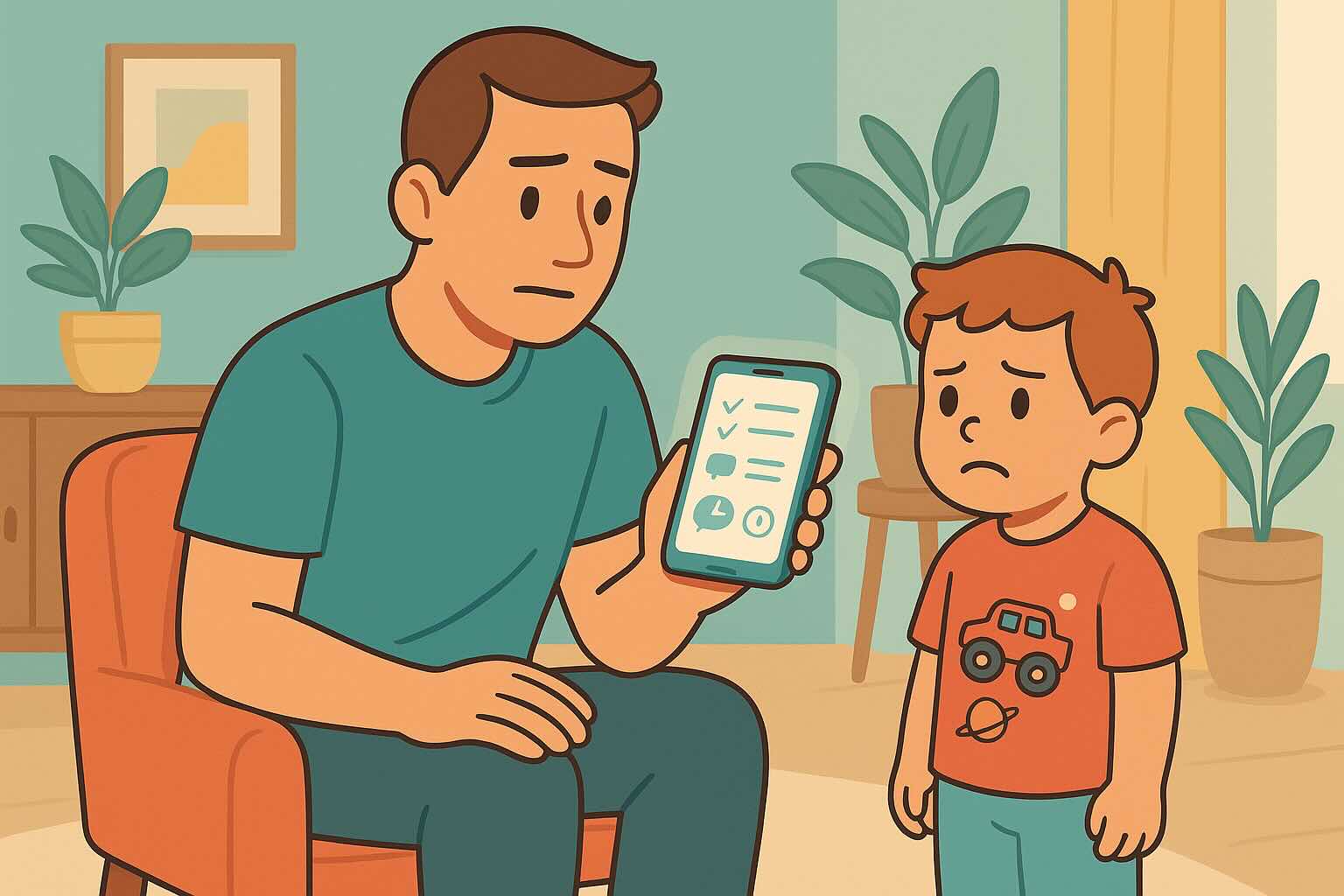
Social Skills Toolkit
Help your child navigate social challenges with resilience-building strategies, perspective-taking tools, and friendship skills.
Frequently Asked Questions
Need personalized support?
RootWise's AI coach can provide tailored strategies for your specific situation, available 24/7 when you need it most.
Learn More About AI Coaching →